常见的Chinglish及真确表达
中式英语 Chinglish

3. 你是做什么工作的呢? 你是做什么工作的呢? 误:What's your job? 正:Are you working at the moment? 如今西方世界失业率居高不下,西班牙的失业 率已经高达20%。 如果谈话对象刚刚失业,如此 直接的问法会让对方有失面子,所以要问: Are you working at the moment? (目前您在上班吗?)接下来才问:Where are you working these days?(目前您在哪儿工作呢?)或 者What line of work are you in? (您从事哪个行业 呢?)
5. 现在几点钟了? 现在几点钟了? 误:What time is it now? 正:What time is it, please? 或 What time is it by your watch? What’s the time by your watch? 提示:What time is it now是一个直接从 汉语翻译过的句子,讲英语的时候没有必 要说now,因为不可能问What time was it yesterday?所以符合英语习惯的说法是:请 问现在几点了?
4. 明天我有事情要做。 明天我有事情要做。 误:I will have something to do tomorrow。 正:I will be tied up all day tomorrow. 提示:用I have something to do来表示 很忙,这也完全是中国式的说法。因为每 时每刻我们都有事情要做,躺在那里睡大 觉也是事情。所以可以说我很忙,脱不开 身:I‘m tied up. 还有其它的说法: Sorry, I will be fully occupied I can't make it at that time. I'd love to, but I can't. I have to stay at home.
中国式英语 Chinglish
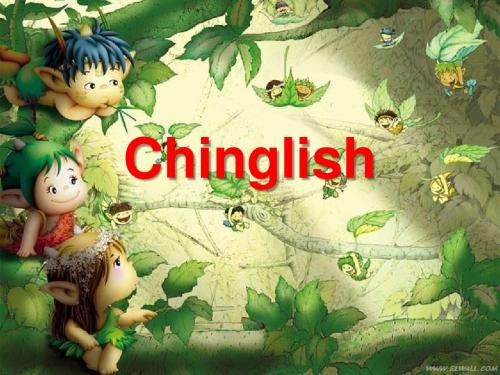
Available
1. 对不起,没座了。 Chinglish: Sorry, we have no seats now. Revision: Sorry, no seats available. 2. 网站暂时无法访问。 Chinglish: This website can't be visited temporarily. Revision: Website Temporarily Unavailable. 这个词有点怪,是形容词,但是一般放到所修饰的词后面。 凡句子中含有是“有…可以用到”的时候都可以考虑这个 词。这个词关系到我们思维方式,而不是这个词用法有多 复杂。反义词是unavailable. 有时候尽管不是非用available/unavailable不可,但是多 用一些,看起来正宗。 在中搜索结果: 是约有441,000,000项符合 available的查询结果,即4亿多条.
Difference
1. 你说的什么移动, 联通, 我看还不一路货色。 You’re talking about Telecom and Unicom. The way I see it, they make no differences at all. 2. 这种化妆品你用用看,效果绝对不一样。 Chinglish: Please use this kind of cosmetics, the effect is absolutely different. Revision: Please try this sort of cosmetics, I bet it’ll make a big difference. Beg to differ 3. 上帝啊,再给我一次机会,我不会再这样了。 Chinglish: God, please give me a chance again, I won’t do this again. Revision: God, please grant me another chance, and I’ll make a difference. 西方人崇尚个人奋斗,追求与他人不一样。这个词,对于他们来说,太 神圣了。在中,make a difference这一短语搜索结果近600万。 Make a difference(有很大不同)或make no differences(没什么不 同)。凡是一样不一样,都可以考虑这2个短语。
【英语学习】Chinglish快快避免!

【英语学习】Chinglish快快避免!1. There be 的泛滥使用例如:有两个男生每天都在操场上打篮球。
有个女孩让我给她签个名。
结果写成:There are two boys play basketball on the playground every day. There was a girl asked for my signature.分析:“有”这个字其实是汉语发语词之一,不需翻译。
上面两个例句不仅是啰嗦的,也是有语法错误的。
中国使用者的 There be 十有八九都是能砍掉的。
应为:Two boys play basketball on the playground every day. A girl asked for my signature.2. 情态动词(尤其是can)的泛滥使用。
例如:良好的习惯能让我们生活得更好。
这袋米能有25公斤重。
结果写成:Good habits can make us live better. This bag of rice can weigh 25 kilograms.分析:情态动词 can 表示能力 (Michael can swim.)、请求/允许(Can I help you?)、主观推测(This story cannot be true)及客观可能性(The climate here can be very unpleasant in January.)。
而且做主观推测时不用在肯定句中。
中文的情态动词泛滥比较严重(也是为什么中文听上去客套含蓄甚至虚浮的原因),所以把“能”等同于can几乎是我鉴别写作者是否为中国籍的重要标准之一。
实际上表达一个既定的事实(而非蕴藏的能力、可能性、趋势等),无需用任何情态动词。
应为:Good habits make our lives better. This bag of rice weighs as much as 25 kilograms. 如果表主观推测:This bag of rice may well weigh 25 kilograms.3. 关于I‘M CHINESE错误:I am a Chinese. / As a Chinese ....正确:Chinese是形容词,应该是I am Chinese / As Chinese。
50个chinglish的例子
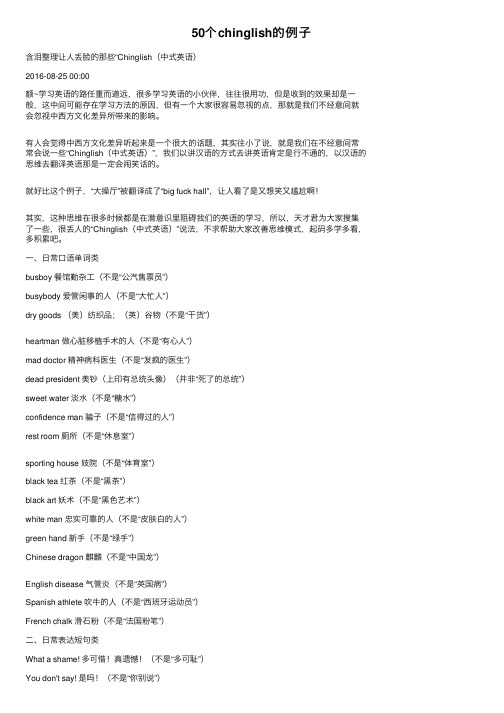
50个chinglish的例⼦含泪整理让⼈丢脸的那些“Chinglish(中式英语)2016-08-25 00:00额~学习英语的路任重⽽道远,很多学习英语的⼩伙伴,往往很⽤功,但是收到的效果却是⼀般,这中间可能存在学习⽅法的原因,但有⼀个⼤家很容易忽视的点,那就是我们不经意间就会忽视中西⽅⽂化差异所带来的影响。
有⼈会觉得中西⽅⽂化差异听起来是⼀个很⼤的话题,其实往⼩了说,就是我们在不经意间常常会说⼀些“Chinglish(中式英语)”,我们以讲汉语的⽅式去讲英语肯定是⾏不通的,以汉语的思维去翻译英语那是⼀定会闹笑话的。
就好⽐这个例⼦,“⼤操厅”被翻译成了“big fuck hall”,让⼈看了是⼜想笑⼜尴尬啊!其实,这种思维在很多时候都是在潜意识⾥阻碍我们的英语的学习,所以,天才君为⼤家搜集了⼀些,很丢⼈的“Chinglish(中式英语)”说法,不求帮助⼤家改善思维模式,起码多学多看,多积累吧。
⼀、⽇常⼝语单词类busboy 餐馆勤杂⼯(不是“公汽售票员”)busybody 爱管闲事的⼈(不是“⼤忙⼈”)dry goods (美)纺织品;(英)⾕物(不是“⼲货”)heartman 做⼼脏移植⼿术的⼈(不是“有⼼⼈”)mad doctor 精神病科医⽣(不是“发疯的医⽣”)dead president 美钞(上印有总统头像)(并⾮“死了的总统”)sweet water 淡⽔(不是“糖⽔”)confidence man 骗⼦(不是“信得过的⼈”)rest room 厕所(不是“休息室”)sporting house 妓院(不是“体育室”)black tea 红茶(不是“⿊茶”)black art 妖术(不是“⿊⾊艺术”)white man 忠实可靠的⼈(不是“⽪肤⽩的⼈”)green hand 新⼿(不是“绿⼿”)Chinese dragon 麒麟(不是“中国龙”)English disease ⽓管炎(不是“英国病”)Spanish athlete 吹⽜的⼈(不是“西班⽛运动员”)French chalk 滑⽯粉(不是“法国粉笔”)⼆、⽇常表达短句类What a shame! 多可惜!真遗憾!(不是“多可耻”)You don't say! 是吗!(不是“你别说”)You can say that again! 说得好!(不是“你可以再说⼀遍”)It has been 4 years since I smoked. 我戒烟4年了。
50个chinglish的例子

50个chinglish的例子1. "我们要去公园玩儿ball。
"2. "请你帮我个忙,可以open一下电脑吗?"3. "我最近想买个新的手机,你有没有什么recommendations?"4. "你能帮我看看这个cake怎么样吗?"5. "昨天我去了一家新开的餐馆,他们的food很好吃。
"6. "今天天气很好,我们一起去外面take个walk吧。
"7. "我不太会cook,你能教我一些简单的recipes吗?"8. "这件衣服很nice,我很喜欢它的style。
"9. "我觉得我们需要一些新的furniture来装饰房间。
"10. "这双鞋虽然贵一点,但是它的quality很好。
"11. "我昨天去了一趟shopping mall,买了一些新的衣物和accessories。
"12. "我的手机坏了,我需要找个手机修理店帮我repair一下。
"13. "这个电视的画质比较清晰,我很喜欢它。
"14. "我想给我爸爸买个surprise gift,你有什么建议吗?"15. "这个书架上的书太乱了,需要整理一下。
"16. "我现在学习了一些中文单词,但是我还不太会说。
"17. "今天早上我和朋友去了一家新开的咖啡馆,他们的咖啡味道很棒。
"18. "这个电影的情节很有趣,我建议你可以去看一下。
"19. "我们要赶紧打车,不然会迟到的。
"20. "我上个星期去了一趟海滩,那里的海水很清澈。
"21. "我最近开始学习弹吉他,但是还不太熟练。
Chinglish
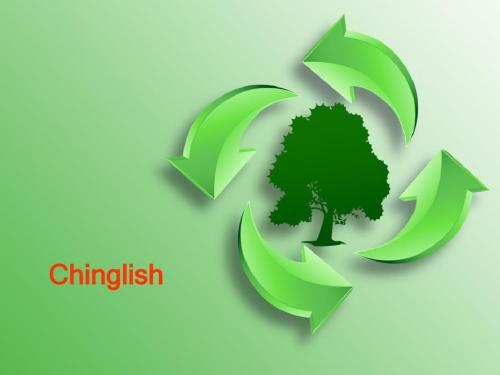
谢谢观赏
WPS Office
Make Presentation much more fun
@WPS官方微博 @kingsoftwps
Chinglish
• Geliable! • Geliable其实是从网友发言中的 ungeliable转过来的。前缀“un-”在英 语中表示否定,后缀“-able(表示能 力)”在英语中表示单词为形容词; 而中间的“geli”却是直接音译自中文 的“给力(geili)”。
• Niubility或newbility • 牛× • 显然是拼音“Niubi”+表示能力 的英文后缀“-bility”组合而成的 一个词。也有网友写法为 Newbility。
• Heart flower angry open. 心花怒放 • Horse horse tiger tiger. 马马虎虎 • Good good study, day day up. 好好学习, 天天向上 • No three no four. 不三不四 • Know is know, noknow is noknow. 知之为 知之,不知为不知
• How are you ? How old are you? 怎么是你,怎么 老是你? • You have seed. I will give you some color to see see. Brothers!Together up! 你有种,我要给你点颜 色瞧瞧,兄弟们,一起上! • Dragon born dragon, chicken born chicken, mouse"s son can make hole! 龙生龙,凤生凤,老 鼠的儿子会打洞! • Chickens That Did Not Have Sexual Experience 童子鸡 • Four Glad Meatballs 直译:四个开心的肉球 被用 为:四喜丸子
电子辞典:十大爆笑Chinglish,你听过几个?

电子辞典:十大爆笑Chinglish,你听过几个?
Chinglish指的是中国人发明的英语,这些看起来的小错误小尴尬,非常能给人带来捧腹大笑的喜感。
以下是电子辞典分享网友们评出来的十大爆笑Chinglish,你听过几个?
NO.1 Good good study, day day up。
好好学习,天天向上
NO.2 How are you ? How old are you?
怎么是你,怎么老是你?
NO.3 You have seed. I will give you some color to see see. Brothers!Together up!
你有种,我要给你点颜色瞧瞧,兄弟们,一起上!
NO.4 You ask me,me ask who?
你问我,我问谁?
NO.5 We two who and who?
咱俩谁跟谁?
NO.6 No three no four。
不三不四
NO.7 Horse horse tiger tiger。
马马虎虎
NO.8 One car come,one car go,two car pengpeng,one car died!
关于一场车祸的描述
NO.9 people moumtain people sea
人山人海
NO.10 If you want money,I have no;if you want life,I have one!
要钱没有,要命一条。
50个chinglish的例子
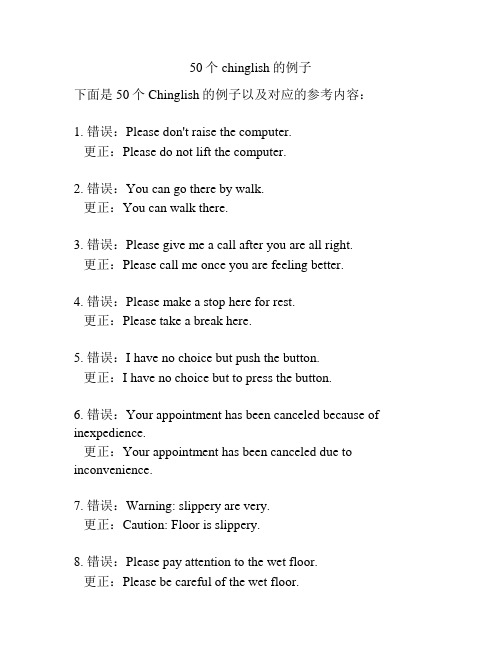
50个chinglish的例子下面是50个Chinglish的例子以及对应的参考内容:1. 错误:Please don't raise the computer.更正:Please do not lift the computer.2. 错误:You can go there by walk.更正:You can walk there.3. 错误:Please give me a call after you are all right.更正:Please call me once you are feeling better.4. 错误:Please make a stop here for rest.更正:Please take a break here.5. 错误:I have no choice but push the button.更正:I have no choice but to press the button.6. 错误:Your appointment has been canceled because of inexpedience.更正:Your appointment has been canceled due to inconvenience.7. 错误:Warning: slippery are very.更正:Caution: Floor is slippery.8. 错误:Please pay attention to the wet floor.更正:Please be careful of the wet floor.9. 错误:Welcome to our hotel. And we hope you will sleep well. 更正:Welcome to our hotel. We hope you have a comfortable stay.10. 错误:I go to work by subway once one day.更正:I take the subway to work every day.11. 错误:The hotel has free wife.更正:The hotel has free Wi-Fi.12. 错误:Please read carefully before you sign the document.更正:Please read the document carefully before signing.13. 错误:You should keep the safety in mind when you travel. 更正:Please keep safety in mind while traveling.14. 错误:Please press the button twice to close the door.更正:Please press the button twice to close the door.15. 错误:The event was held in a high degree of perfection.更正:The event was executed with great precision.16. 错误:Please make sure to take off your coat before entering. 更正:Please remember to take off your coat before entering.17. 错误:This shop sells a wide variety of electronic things.更正:This shop sells a wide variety of electronics.18. 错误:Please keep your eye on your belongings.更正:Please keep an eye on your belongings.19. 错误:Please put up the cautionary electrical fence.更正:Please put up the electric fence as a cautionary measure.20. 错误:Please be aware that falling ice are dangerous.更正:Please be aware that falling ice is dangerous.21. 错误:There is a meeting will be held tomorrow.更正:There will be a meeting tomorrow.22. 错误:The director invites all the staff to a dinner party.更正:The director invites all the staff to a banquet.23. 错误:In China, people eat with chopsticks in every meal.更正:In China, people use chopsticks for every meal.24. 错误:We would like to express our sincere apologize for any inconvenience caused.更正:We would like to express our sincere apologies for any inconvenience caused.25. 错误:Please be kindly to passengers with disabilities.更正:Please be kind to passengers with disabilities.26. 错误:We apologize for any disaster caused.更正:We apologize for any inconvenience caused.27. 错误:Your flight is already keep on hold.更正:Your flight is already on hold.28. 错误:Please remember to bring along your identification cards.更正:Please remember to bring your identification cards.29. 错误:The food in this restaurant tastes very delicacy.更正:The food in this restaurant is very delicious.30. 错误:Please be careful when you cross the bridge.更正:Please exercise caution when crossing the bridge.31. 错误:I'm sorry, but the restroom is under clean now.更正:I'm sorry, but the restroom is currently being cleaned.32. 错误:Please take care of your personal stufs.更正:Please take care of your personal belongings.33. 错误:Would you like to have a cup of warm water?更正:Would you like a cup of hot water?34. 错误:I feel very much happiness to meet you.更正:I am very happy to meet you.35. 错误:Your package is on the way to delivering.更正:Your package is on its way to being delivered.36. 错误:Please keep your valuables unattended.更正:Please do not leave your valuables unattended.37. 错误:The driver will come and pick up you.更正:The driver will come and pick you up.38. 错误:Our company provides a suit of services.更正:Our company provides a variety of services.39. 错误:Please do not remember your password on a public computer.更正:Please do not save your password on a public computer.40. 错误:We appreciate that you cooperate us.更正:We appreciate your cooperation.41. 错误:Please keep silent in the library.更正:Please maintain silence in the library.42. 错误:Please take care of the fire when cooking.更正:Please be cautious with fire when cooking.43. 错误:Please dispose your trash inside the bin.更正:Please dispose of your trash inside the bin.44. 错误:Please pay attention that the elevator is under repair.更正:Please be aware that the elevator is under repair.45. 错误:Please don't make noise during the public transit.更正:Please refrain from making noise during public transit.46. 错误:Please be notice that the exhibit will be closed tomorrow.更正:Please take note that the exhibit will be closed tomorrow.47. 错误:Please excuse me for my no familiar behavior.更正:Please excuse my unfamiliar behavior.48. 错误:Please take off your shoes when you enter the house.更正:Please remove your shoes when you enter the house.49. 错误:Please don't walk on the street.更正:Please do not walk in the street.50. 错误:Please dial the number again after clear up.更正:Please redial the number after hanging up.这些例子展示了Chinglish中常见的错误用法以及如何进行修正。
50个chinglish的例子

50个chinglish的例子Chinglish(中式英语)是指因中文直译或中文表达方式和惯用法被误用而形成的一种中英混合的英语表达方式。
在中国,由于中文和英文的差异,很容易产生Chinglish。
这些Chinglish表达方式在我们使用英语进行沟通时可能会引发误解,给人留下不正式或不专业的印象。
以下是50个例子,用简体中文写。
1.冰箱上贴有标签:"请不要食用冰!"2.商店门口挂着招牌:"衣物在洗涤时请拔去电脑"3.饭店菜单上的一道菜:"炒孜然鸡球摆放在碗中"4.银行柜台的公告:"在结账前,请不要再次提款"5.园区内的标志牌:"请勿在大门口傻笑"6.一张标签:"用油不良会出现火灾,切记施施然"7.一份说明书:"在保持风通和光线扩散的前提下,请关闭窗户和帘子"8.卫生间标志牌:"五分钟内请放心使用,五分钟后请用心使用"9.一瓶饮料的标签:"小心,盖子可扣挂在胃部"10.一份旅游宣传单:"欢迎您参观我们的古老又安全的城市"11.翻译软件的翻译结果:"你的英语之路,积极加油"12.外卖餐厅的菜单:"生煎包(洗下即刻)"13.酒店招牌:"欢迎您进入我们舒适而慷慨的卧室"14.商店售卖的马克杯上印着:"Life will be beatuful"15.餐厅菜单上的一道菜:"肉丝抢炒金针菇"16.一家酒店的宣传口号:"忘掉世界的纷纷扰扰,在我们的奢华酒店中和平酣眠"17.星级酒店的规章制度:"请留下你的酒店加班卡"18.商店门口的广告牌:"每日三点请务必停车"19.一张火车站的指示牌:"请不要迟到,火车会等你"20.旅游景点的导览地图:"忘掉迷路的烦恼,在我们精心设计的迷宫中畅游"21.一份产品说明书:"此产品仅适用于四季度"22.一本英文杂志的标题:"事务所办公司,传出奇闻人事之举"23.一份餐厅菜单:"脆皮烤鸭里包围了一层薄薄的皮,其中鲜嫩多汁的肉散发着美味的气息"24.一位导游的口头禅:"请注意,你们的相机将会在这个地方发疯"25.一份广告:"春节将至,火腿好品牌祝大家春节快乐"26.酒吧的招牌:"玻璃门后面有玻璃杯"27.学校公告:"请不要在校园内长期值班,会生病的"28.一位导游的解说词:"那个时候的皇帝生活富有,吃喝玩乐统统有"29.学校宣传海报:"悬挂我们的校徽,以纪念徽章"30.超市招牌:"商店现正促销,打破商品价格"31.一家医院的公告牌:"为了您的健康着想,请随身携带所有身份证明"32.餐厅的菜单:"小炒面,偷偷炒进了香味"33.一家饭店的规定:"客人离开时请关掉电视,以免床受到损害"34.一份购物广告:"如果您不购买产品,请忽略此广告"35.公园公告牌:"请不要站在树上,否则会导致摔倒"36.一份说明书:"使用前,请先确认使用方法"37.一张火车票:"此票仅适用于火车上的座席"38.酒店的宣传画册:"我们的房间有宽敞的窗户,方便新鲜空气进入"39.超市售卖的柠檬水上贴有标签:"提神醒脑,适合开车路上"40.一份产品说明书:"请妥善保管此说明书,可作为枕头空间使用"41.一家饭店的规定:"烟民须在指定区域喷洒烟蒂"42.一份购物广告:"产品免费赠送给所有购买的顾客"43.一张公园公告牌:"园内的花蔓在特定日期爆发开放,请勿错过"44.学校的考试通知:"请穿好衣服参加考试,不要用内裤"45.公园的宣传单:"来吧,尽情享受河流的新鲜口感"46.商场的广告牌:"购物狂欢节,全场饭楼八折"47.酒店的服务要求:"请您尽情享受我们舒适的床和淋浴"48.一份旅游手册:"这座美丽的城市以其让人难以忘怀的城市风景闻名"49.一家餐厅的菜单:"舒坦滑蛋饭,口感香滑舒服"50.一张机场的标志牌:"巴士停车场再过一百米件航站楼入口"通过以上50个例子,我们可以看到Chinglish常常因为直译、语法错误、用词不准确或者本意不明而产生。
chinglish

2. I called him by the wrong name, for which mistake I apologized.
3. My mother may have to go into the hospital, in which case she won’t be going on holiday.
Mark was a student at this university from 1999 to 2003, ____________ he studied very hard and was made Chairman of the Students’ Union. (重庆2005)
A. during which time
B. for which time C. during whose time D. by that time
Chinglish
1.cheong-sam
2.Dingho
长衫,长袍,旗袍
顶好,最水
人参 苦力 磕头
5.Koolie
6.Kowtow
7.Kungfu
功夫 8.Mah-jong 麻将 9.Long time no see
刚才在一个英语学习论坛上,看到一个搞笑帖子,内 容是一个外国人去一家中国公司办事,与前台小姐的 英语对话,下面是原文: 小姐:Hello. 老外:Hi. 小姐:You have what thing? 老外:Can you speak English? 小姐:If I not speak English, I am speaking what? 老外:Can anybody else speak English? 小姐:You yourself look. All people are playing, no people have time. 老外:Anybody here can speak English? 小姐:Shout what shout, quiet a little, you on earth have what thing? 老外:I want to speak to your head. 小姐:Head not zai. You tomorrow come
中国人最常挂在嘴边的Chinglish 你中了几枪
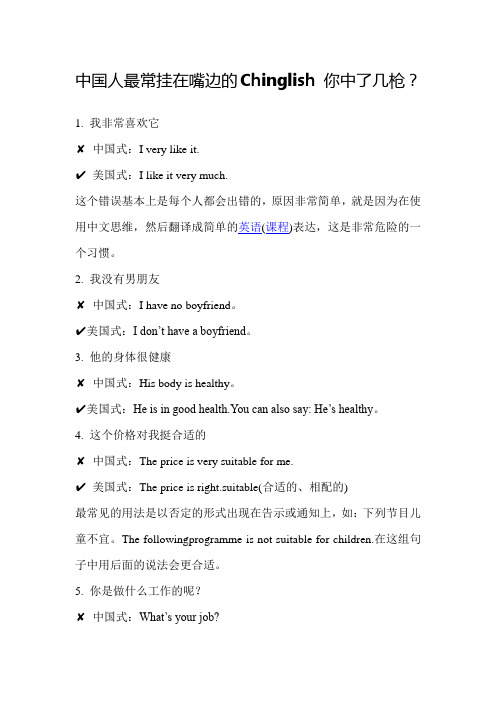
中国人最常挂在嘴边的Chinglish 你中了几枪?1. 我非常喜欢它✘中国式:I very like it.✔美国式:I like it very much.这个错误基本上是每个人都会出错的,原因非常简单,就是因为在使用中文思维,然后翻译成简单的英语(课程)表达,这是非常危险的一个习惯。
2. 我没有男朋友✘中国式:I have no boyfriend。
✔美国式:I don’t have a boyfriend。
3. 他的身体很健康✘中国式:His body is healthy。
✔美国式:He is in good health.You can also say: He’s healthy。
4. 这个价格对我挺合适的✘中国式:The price is very suitable for me.✔美国式:The price is right.suitable(合适的、相配的)最常见的用法是以否定的形式出现在告示或通知上,如:下列节目儿童不宜。
The followingprogramme is not suitable for children.在这组句子中用后面的说法会更合适。
5. 你是做什么工作的呢?✘中国式:What’s your job?✔美国式:What’s your occupation?what’s your job?这种说法难道也有毛病吗?是的。
因为如果您的谈话对象刚刚失业,如此直接的问法会让对方有失面子,所以您要问:目前您是在上班吗?Are you working at the moment?6. 我没有经验✘中国式:I have no experience。
✔美国式:I don’t know much about that。
I have no experience这句话听起来古里古怪,因为您只需要说:那方面我懂得不多,或者这方面我不在行,就行了。
I am not really an expert in this area。
50个chinglish的例子
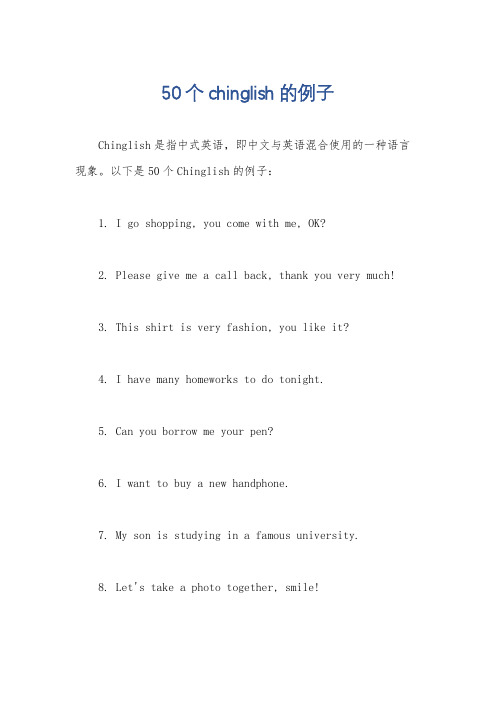
50个chinglish的例子Chinglish是指中式英语,即中文与英语混合使用的一种语言现象。
以下是50个Chinglish的例子:1. I go shopping, you come with me, OK?2. Please give me a call back, thank you very much!3. This shirt is very fashion, you like it?4. I have many homeworks to do tonight.5. Can you borrow me your pen?6. I want to buy a new handphone.7. My son is studying in a famous university.8. Let's take a photo together, smile!9. I have a big stomachache, I need to see a doctor.10. The weather is too hot, I want to drink a glass of ice water.11. I like to eat spicy food, it makes me feel very exciting.12. I have a lot of pressures at work recently.13. You are so clever, can you teach me this math problem?14. My father is a businessman, he travels a lot.15. I will go to supermarket to buy some vegetables and fruits.16. I am very tired today, I want to have a good rest.17. Can you help me to open the TV? It is not working.18. I need to go to the bank to withdraw some money.19. I have a lot of things to do, I am very busy.20. I want to buy a new dress for the party, can you give me some suggestions?21. Please give me a hand, I cannot carry this heavy box.22. I have a bad cold, I need to take some medicine.23. Can you tell me how to use this washing machine?24. My friend is a famous singer, I am very proud of her.25. I want to go to the park to take a walk, do you want to come together?26. I have a lot of dreams, I want to make them come true.27. I need to go to the airport to pick up my cousin.28. My mother is a good cooker, she can make delicious food.29. I am very hungry, let's go to have a big meal.30. I want to buy a new car, but it is too expensive.31. I have a lot of friends, we often have parties together.32. Can you help me to find my glasses? I cannot see clearly.33. I need to go to the post office to send a package.34. I have a lot of hobbies, such as singing and dancing.35. I have a lot of books, I like to read them in myfree time.36. I want to go to the cinema to watch a movie, do you have any recommendations?37. My sister is a good painter, her paintings are very beautiful.38. I need to go to the gym to do some exercises.39. Can you lend me some money? I will pay you back next week.40. I want to buy a new computer, can you help me to choose one?41. I have a lot of clothes, I need to clean up my wardrobe.42. I want to learn how to play the guitar, it is my dream.43. I have a lot of problems, I don't know how to solve them.44. Can you give me a hand? I cannot carry this heavy bag.45. I need to go to the library to borrow some books.46. I have a lot of dreams, I want to achieve them one by one.47. I want to buy a new phone, but I don't have enough money.48. I have a lot of plans for the weekend, I want to have fun.49. Can you help me to fix my bike? It is broken.50. I need to go to the supermarket to buy some groceries.。
不要再说这些Chinglish

要再说这些Chinglish,让你听上去不再那么Asian1. 价格挺合适/挺好的。
Chinglish: The price is very suitable.English: The price is right. / The price is appropriate. / The price is good.提示:suitable(合适的、相配的)最常见的用法是以否定的形式出现在告示或通知中,如:这部影片儿童不宜。
This movie is not suitable for children.2. 你是做什么工作的呢?Chinglish: What's your job?English: Are you working at the moment?提示:前一种说法的语气显得生硬唐突,因为对方可能目前并未上班。
后一种说法——“目前你是在上班吗?”可以引出你要问的问题:目前你在哪儿工作呢?Where are you working at?/ Wheredo you work?或者:你从事哪个行业呢?What line of work are you in? / What type of work doyou do?最简单的问法当然还是:What do you do?3. 用英语怎么说?Chinglish: How to say?English: How do you say that in English?提示:How to say 不是一个完整的句子,而是引领分句。
同类的例子还有:请问这个单词怎么拼?How do you spell that please? 请问这个单词怎么读?How do you pronounce this word?4. 明天我有事。
Chinglish: I have something to do tomorrow.English: I am tied up all day tomorrow.提示:要表达脱不开身,可以说:I'm tied up. 或:I can't make it at that time. I'd love to, but Ican't, I have to stay at home. 即明天不行啊,我很想去,但没办法,得待在家。
英文表达中常见的Chinglish
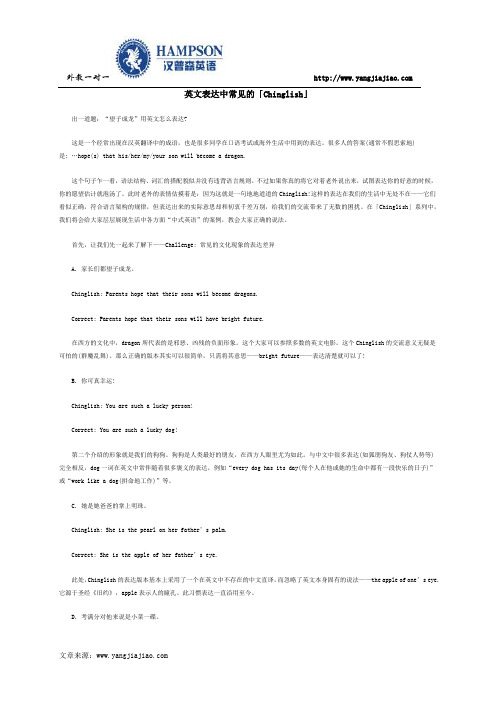
外教一对一英文表达中常见的「Chinglish」出一道题:“望子成龙”用英文怎么表达?这是一个经常出现在汉英翻译中的成语,也是很多同学在口语考试或海外生活中用到的表达。
很多人的答案(通常不假思索地)是: …hope(s) that his/her/my/your son will become a dragon.这个句子乍一看,语法结构、词汇的搭配貌似并没有违背语言规则。
不过如果你真的将它对着老外说出来,试图表达你的好意的时候,你的愿望估计就泡汤了。
此时老外的表情估摸着是:因为这就是一句地地道道的Chinglish!这样的表达在我们的生活中无处不在——它们看似正确,符合语言架构的规律,但表达出来的实际意思却和初衷千差万别,给我们的交流带来了无数的困扰。
在「Chinglish」系列中,我们将会给大家层层展现生活中各方面“中式英语”的案例,教会大家正确的说法。
首先,让我们先一起来了解下——Challenge: 常见的文化现象的表达差异A. 家长们都望子成龙。
Chinglish: Parents hope that their sons will become dragons.Correct: Parents hope that their sons will have bright future.在西方的文化中,dragon所代表的是邪恶、凶残的负面形象。
这个大家可以参照多数的英文电影。
这个Chinglish的交流意义无疑是可怕的(群魔乱舞)。
那么正确的版本其实可以很简单,只需将其意思——bright future——表达清楚就可以了!B. 你可真幸运!Chinglish: You are such a lucky person!Correct: You are such a lucky dog!第二个介绍的形象就是我们的狗狗。
狗狗是人类最好的朋友,在西方人眼里尤为如此。
与中文中很多表达(如狐朋狗友、狗仗人势等)完全相反,dog一词在英文中常伴随着很多褒义的表达,例如“every dog has its day(每个人在他或她的生命中都有一段快乐的日子)”或“work like a dog(拼命地工作)”等。
Chinglish
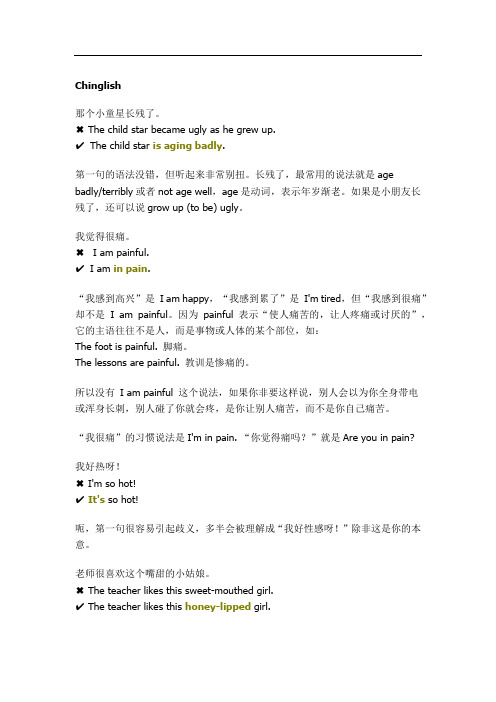
Chinglish那个小童星长残了。
✖ The child star became ugly as he grew up.✔The child star is aging badly.第一句的语法没错,但听起来非常别扭。
长残了,最常用的说法就是agebadly/terribly或者not age well,age是动词,表示年岁渐老。
如果是小朋友长残了,还可以说grow up (to be) ugly。
我觉得很痛。
✖I am painful.✔I am in pain.“我感到高兴”是I am happy,“我感到累了”是I'm tired,但“我感到很痛”却不是I am painful。
因为painful 表示“使人痛苦的,让人疼痛或讨厌的”,它的主语往往不是人,而是事物或人体的某个部位,如:The foot is painful. 脚痛。
The lessons are painful. 教训是惨痛的。
所以没有I am painful 这个说法,如果你非要这样说,别人会以为你全身带电或浑身长刺,别人碰了你就会疼,是你让别人痛苦,而不是你自己痛苦。
“我很痛”的习惯说法是I'm in pain. “你觉得痛吗?”就是Are you in pain?我好热呀!✖ I'm so hot!✔It's so hot!呃,第一句很容易引起歧义,多半会被理解成“我好性感呀!”除非这是你的本意。
老师很喜欢这个嘴甜的小姑娘。
✖ The teacher likes this sweet-mouthed girl.✔ The teacher likes this honey-lipped girl.中国人喜欢说“嘴甜”,但honey-lipped 更符合英美人的语言习惯,表示会说话。
萝卜青菜,各有所爱。
✖ Some prefer radish but others prefer cabbage.✔ Tastes differ.Tastes differ/vary 是句英语谚语,除此以外,原句还可翻译成No dish suits all tastes 或You can never make everyone happy 等。
Chinglish

[误] Doingshi imitates Xishi. [正] The ugly imitates the beautiful in such a distorted way that the ugliness of the ugly becomes worse. 注:把原文按照字面意思直译过来,恐怕只有中国人能够理解。要 想让外国人明白这个中国成语,就要对译文进行解释性加工了。 同样,“情人眼里出西施” [误]Xishi is in the eye of the beholder [正]Beauty is in the eye of the beholder。
文化差异 风俗习惯
百里挑一
[误] one in a hundred • [正] one in a thousand • 注: “百里挑一”常被用来形容“很特别,很出众”或“与众不
同”,one in a thousand 也有相同的含义。 • 但值得注意的是,汉语用“百”,而英语则以十倍于百的 thousand 来夸张。 • 同样,汉语的“十分感谢”或“万分感谢”,英语则说 a thousand thanks(千分感谢)或 thanks a million times(百万次的感谢)。 可见,英语比汉语要夸张。这也许反映了两个民族不同的思维方式: 中国人崇尚中庸之道,凡事避免走极端,即使夸大其词也不太过火; 而英美人追求标新立异和充分考虑表现自我,这在语言中自然也有 体现
他一向嘴硬,从不认错
[误] He has always got a hard mouth and never admit a fault. • [正] He never says uncle. • 注:say (cry) uncle: to give up or in; to surrender; to admit defeat. Mainly used by boys, as when fighting。 • 主要是男孩们打架时的用语,当一方想制服另一方时,就 用命令的口气说:“Say uncle!”这时,有的孩子为了表示 不服输,就是不说。后来,say uncle 就成了“服输”的代 名词,而 not say uncle 就相当于“嘴硬”了。
chinglish

▪To take notice of safe: The slippery are very crafty. = Be careful, slippery slopes.(小心路滑。
)[1]▪To put out Xuanda Expressway(北京四环路). To put in Jingzhang Expressway.(京张高速公路)= Now leaving Xuanda Expressway, now entering Jingzhang Expressway.▪Decimbing path. = Descent.(下坡路。
)▪Rain or snow day. Bridge, slow-driving.(下雨或雪天。
桥,慢速行驶。
河北省所有高速公路)= Slow on bridge in case of rain or snow.(在雨天或雪天时过桥请减速行驶。
)▪Oil gate. / Into. = Filling station.(加油站。
)/ Entrance.(进口。
)▪Smoking is prohibited if you will be fined 50 yuan.(字面意义:如果你被罚50元的话吸烟不被允许。
)= Smoking is prohibited. There will be a 50 yuan fine for violators.(不可吸烟,违反者将被罚款50元。
)▪Please come down from your bicycle. = Please dismount your bicycle.(请从您的自行车上下来。
)▪If you have trouble ask for the policeman.或If in trouble find police = In case of trouble dial the police.▪Being urgent call 110 quickly.(急,快打110。
- 1、下载文档前请自行甄别文档内容的完整性,平台不提供额外的编辑、内容补充、找答案等附加服务。
- 2、"仅部分预览"的文档,不可在线预览部分如存在完整性等问题,可反馈申请退款(可完整预览的文档不适用该条件!)。
- 3、如文档侵犯您的权益,请联系客服反馈,我们会尽快为您处理(人工客服工作时间:9:00-18:30)。
常见的Chinglish及真确表达!我们先看几个来自生活中的句子,都是常见句子(注:所谓Chinglish只是相对,并非绝对):第一词:TRY1、这蛋糕真好吃,你尝点。
Chinglish:This cake is so delicious, please eat a little.Revision: The cake is so delicious. Please try some.2、这样不行,你再看看。
Chinglish: It won't do. Please see it again.Revision: It won't do. Please try again.3、我做过一两次,都失败了。
Chinglish: I did one or two times, but I failed.Revision: I tried a couple of times, but I failed.4、请您放心,我一定有多少力,出多少力。
Chinglish: Please put down your heart. I'll give all my strength out.Revsion: Don't worry, I'll try my best.5、这件裙子真漂亮,你穿上看看?This skirt looks so beautiful. Would you please try it?凡是带有“尝试”、做事没底但是还是做了等,可以选用try一词,简单又实用。
当然,try 还有审判的意思。
So, Please try this word more often.在中对try的原形进行搜索,“约有158,000,000项符合try的查询结果”,也就是近1.6亿个结果。
可见try是多么受欢迎。
那么我们用过多少次?第二词 Enjoy这一动词我印象比较深刻,它的用法比较简单,凡是带有“享受到”的意思就可以用。
反义词是suffer (from)。
经典用法是享有。
声誉。
在公司、单位英文介绍里可以说简直是不可或缺的一个词。
如:In Africa, Botswana is one of the few countries which enjoysa good reputation for corruption control and the DCEC has attracted favourable attention from analysts, donors and Botswana's regional neighbours.顺便再说一句,好的用enjoy,不好的可用suffer。
一想到灾难、甚至阿富汗、伊拉克什么的就应该想到suffer这个词。
这个词就不单独列出来了。
再如:UN conference to study why women in war-torn States sufferjustice deficit.第三词 Available这个词有点怪,是形容词,但是一般放到所修饰的词后面。
凡句子中含有是“有。
可以用到”的时候都可以考虑这个词。
这个词关系到我们思维方式,而不是这个词用法有多复杂。
反义词是unavailable.现在都讲究资源了先看几个句子:1、对不起,没座了。
Chinglish: Sorry, we have no seats now.Revision: Sorry, no seats available.2、网站暂时无法访问。
Chinglish: This website can't be visited temporarily.Revision: Website Temporarily Unavailable.有时候尽管不是非用available/unavailable不可,但是多用一些,看起来正宗。
在中搜索结果:是约有 441,000,000项符合available的查询结果,即4亿多条,但是我们用过几次。
他们爱用的我们老不用,难怪正宗度老是大打折扣。
要学习例句,里多得是。
几亿条了可不是?br>第四词 Surprise有人可能会说,这个词有什么了不起?选中这个词,完全就看重这个词包含的一种文化。
西方人注重生活情调,特别看重带给朋友或家人的“惊喜”。
先看几个句子:1、我男朋友来看我了。
真是个惊喜!My boyfriend has come to see me. It's really a big surprise!2、对于这名老教师来说,真是惊喜连连啊。
To this veteran teacher, it's one surprise after another.在中,约有25,100,000项符合surprise的查询结果。
第五词 Skills首先感谢上面的朋友捧场。
我们一起学习,一起进步。
作“技能、水平”讲。
以前一想到“水平”一词,就会想到level一词,但是老外可不是这么想的。
skills一词,更近。
先看几个句子:1、怎样才能提高我们的英语水平?Chinglish:How to improve our English level? (他们一般不这么说,但是应该可以看懂)Revision :How to improve our English skills?2、他写作、翻译水平很高。
Chinglish:His writing and translating level are very high.Revision:He has very good writing and translation skills.现在追求技术的时代,skills也走俏。
什么English skills, computer skills, study skills, survival skills, writing skills...都泛滥了,我们也"决口"一次如何?第六词 Offer这个词比较微妙。
英译中时不太好处理,正因如此,这个词才值得我们重视。
先看几个句子:1、谢谢你的好意,不过我可以走回去。
Chinglish:Thank you for your goodwill, but I can go home on foot.Revision: Thanks for your offer, but I can walk home.2、全国人民纷纷向灾区伸出了援助之手。
version 1:People from all over the country all giving their hands to the disaster area.Alt Version: People from all over the country are offering helping hands to the disaster area.3、他给了一件工作给我。
version 1: He gave me a job to do.Better version: He offered me a job.Offer可以做动词用,也可以做名词用。
还有一些固定搭配,其中Job offer非常红。
凡是带有“给予”、“善意提供的(帮忙)”等意思,就可以考虑offer这个词。
我们可以把give一些空间让点给offer。
这个机会可是我最后给你的。
答应不答应随你的便。
This is my last offer to you. Take it or leave it.第七词 Difference意思是差别。
对于difference只需要掌握一到两个短语,我们口语水平就会前进一大步,让你的同学对你刮目相看,那就是make a difference(有很大不同)或make no differences (没什么不同)。
1、你说的什么移动、联通,我看还不一路货色。
You're talking about Telecom and Unicom. The way I see it, they make no differences at all.2、这种化妆品你用用看,效果绝对不一样。
Chinglish: Please use this kind of cosmetics, the effect is absolutely different.Revision: Please try this sort of cosmetics, i bet it'll make a big difference.(不好意思,我就是喜欢try这个词)3、上帝啊,再给我一次机会,我不会再这样了。
Chinglish:God, please give me a chance again, I won't do this again.Revision: God, please grant me another chance, and I'll make a difference.凡是一样不一样,都可以考虑这2个短语,你用好了,绝对可以make a difference。
另外说一下,受教科书的影响,说不同的时候中国学生习惯be different from这一句型。
但是很多时候differ from这个动词形式更简单,try it, and you'll make a difference,让你的老师、同学对你刮目相看。
西方人崇尚个人奋斗,追求与他人不一样。
这个词,对于他们来说,太神圣了。
在 中,make a difference这一短语搜索结果近600万,我们用过几次了。
所以以后有条件,我们就要make a difference,没有条件时,创建条件也要make a difference。
第八词 pointpointless(没意义)一词也算它一伙的。
提到这个词,完全是meaning 一词在作怪。
先看几个例子:1、你这样做是什么意思?Chinglish: What is your meaning in doing this?Revision: What's your point?2、如果你抽烟的话,哪怕就别怕得癌症。
再问“上帝怎么这样对我啊”没什么意义。
Chinglish: If you smoke, you should not be afraid to get lung cancer. It's meaningless to ask "why did God do this to me?". (注:meaningless可用,但是老外不爱用,爱用的是我们)Revision: If you smoke, you should be prepared to get lung cancer; it's pointless to ask "why did God do this to me?".要@脑子,转变中式思维习惯,就别怕“矫枉过正”。
